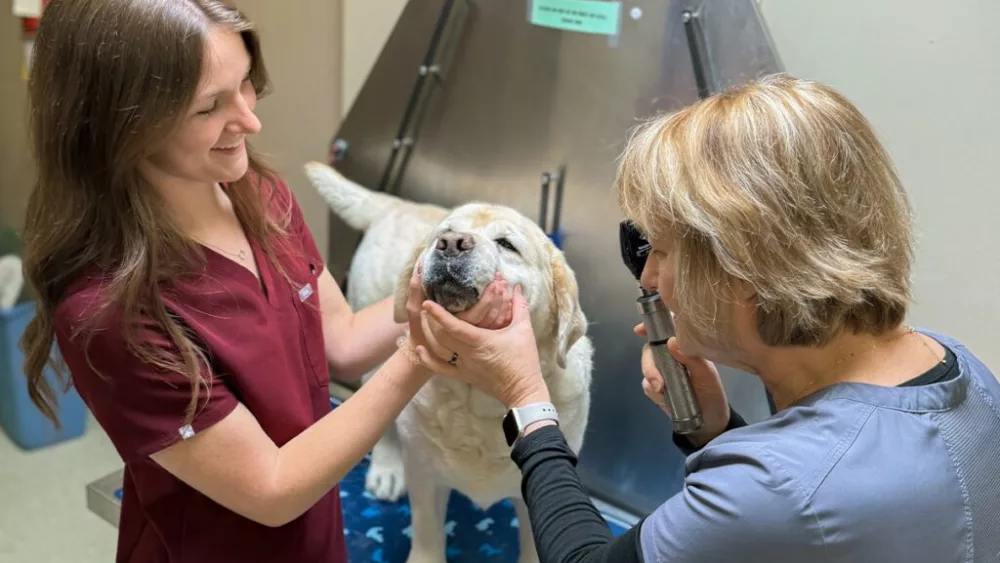Pullman, WA. — A sausage at Washington State University has made history.
WSU received U.S. Food and Drug Administration authorization to have gene-edited pigs enter the food chain for human consumption — in this case, as tasty, German-style sausages.
“It’s important for a university to set the precedent by working with federal regulators to get these animals introduced into the food supply,” said Jon Oatley, a professor in the School of Molecular Biosciences in WSU’s College of Veterinary Medicine. “If we don’t go through that process, all of the research we’re doing is for naught because it will never make it out into the public.”
Oatley uses the gene-editing tool CRISPR to improve genetic traits in livestock and is working toward an FDA approval for a line of gene-edited pigs. He undertook the investigational food use authorization process for five gene-edited pigs to demonstrate that food made from the animals is safe to eat and that it is possible for an academic institution to achieve this type of FDA authorization. Gene-editing can make changes in an organism’s DNA that could occur in nature or through selective breeding but would take much longer without a tool like CRISPR.
The FDA authorization is investigational, and limited to these particular pigs, but shows that gene-editing livestock to quickly produce desirable traits for improved food production is a viable strategy for helping feed the planet’s growing population.
The 2-year-old pigs were processed at the WSU Meat Lab, and the U.S. Department of Agriculture inspected the meat as it does with all meat products. Working with the Meat Lab, meat scientist Blake Foraker made some of the pork into sausages, which will be used in catering services that raise travel funds for the student members of the WSU Meat Judging team.
The pigs were originally gene-edited in a way that would enable researchers to use them to sire offspring with traits from another male pig. Known as surrogate sires, this technology first gene-edits male animals to be sterile by knocking out a gene called NANOS2 that is specific to male fertility. These animals can then be implanted with another male’s stem cells that create sperm with that male’s desired traits to be passed on to the next generation.
Essentially a high-tech form of selective breeding, surrogate sire technology can greatly expand dissemination of valuable genetics in livestock. It has the potential to not just improve meat quality but the health and resilience of livestock in the face of changing environmental conditions, a critical goal for increasing protein sources in developing nations.
The surrogate sires’ progeny, which are themselves not gene-edited, have not yet been reviewed by the FDA for possible inclusion in the food chain. Securing the investigational approval for these five pigs required clearing a number of hurdles. The FDA waives some fees for nonprofits like universities, but by the time the process was completed, Oatley’s team had spent two years and approximately $200,000 collecting data for this authorization.
“The original intent in making these animals was to try to improve the way that we feed people,” he said. “And we can’t do that unless we can work with the FDA system to get these animals actually into the food chain.”
Only one other organization, a company by the name of Acceligen, has had a gene-edited animal receive the FDA ok to enter the food supply. In 2020, the FDA made a low-risk determination for products made from “Slick-Haired Cattle” who are gene-edited to have coats that increase the animals’ resilience to higher temperatures. Other companies have had genetically-modified animals approved by the FDA, but the approach was transgenic which is a different technology involving inserting DNA from outside species into the genome of an organism. Gene-editing is a modern, cutting-edge technology that works only within a species’ DNA and can make changes that could come about naturally or through traditional breeding practices.
The public often holds many misconceptions about gene-editing, Oatley said, and hopes that the WSU example will help dispel misinformation and improve perceptions of this technology.
“There’s a trust that comes with university-based research,” he said. “At WSU, we’re all about the science. We just want to make sure the research is valid, and the animals we produce are healthy.”




